Chickens typically enjoy having small but frequent meals throughout their day. They have balanced diets to ensure proper growth and to keep them healthy.
Their feeds should include food that is rich in vitamins and minerals. What better source is out there than a refreshing and delectable fruit like watermelon!
But are watermelons healthy for chickens? Watermelons are healthy for chickens. Not only does it have a 92% water content, but it is also an excellent source of Vitamin C, which helps regulate the immune system of chickens, and fiber, which aids in chickens’ digestive functions. It is also rich in other micronutrients, such as copper and magnesium.
Read more of this article to find out if chickens like watermelons, what part of the juicy fruit they can eat, how to prepare some watermelon treats for chickens, and more!
Do Chickens Like Eating Watermelons?
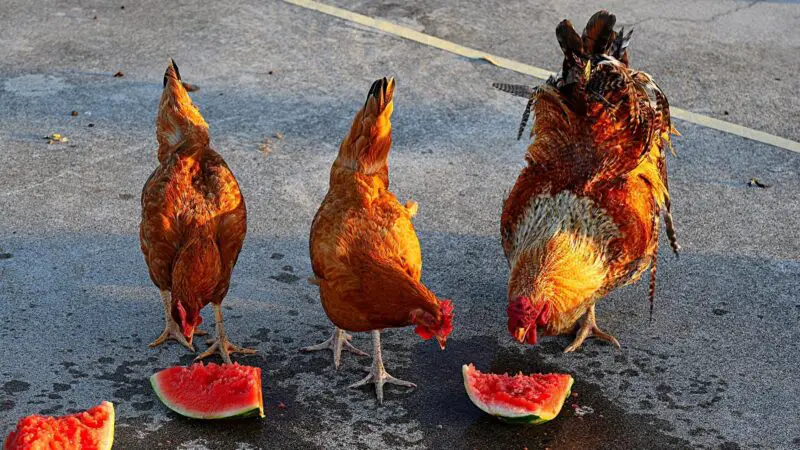
Chickens like eating watermelons, especially when experiencing intense summer heat, and they need to ingest something that helps them cool down.
Aside from providing enough shade and hydration for chickens to cope with the temperature increase, watermelons are also used by poultry owners.
Watermelons are a cool and rejuvenating snack for chickens, and they’re typically served as frozen treats. The chickens like to peck on watermelons while they thaw.
According to an agricultural educator, watermelons should comprise less than or equal to 10% of the total daily diet of a chicken to not cause any imbalances in their feeds.
What Parts of the Watermelon Can Chickens Eat?
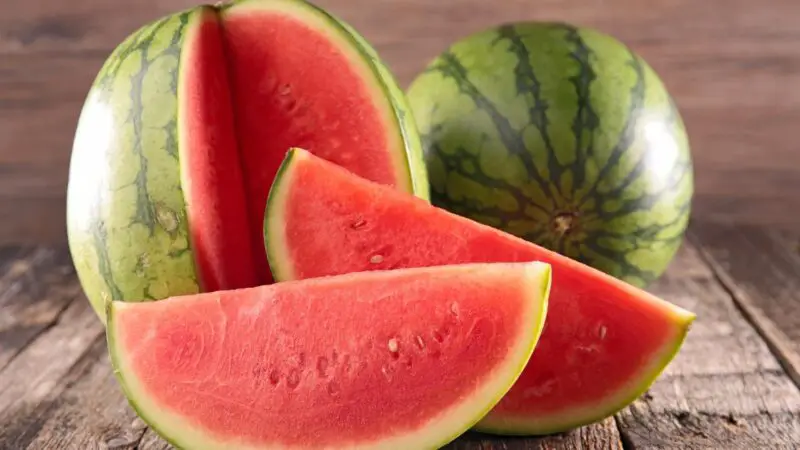
Can Chickens Eat the Watermelon Skin?
Chickens can eat watermelon skin. However, it should be fed together with the rind or flesh, as eating watermelon skin alone can block the digestive and intestinal tracts of chickens.
Smaller-sized chickens and chicks will be at risk of blockage, so it’s best to avoid adding watermelon skin to their feeds.
Can Chickens Eat Watermelon Rind?
Chickens can eat watermelon rind. They are not as picky as humans when it comes to food, so they don’t mind the bland taste of watermelon rinds.
In fact, researchers suggest including watermelon rinds as dietary supplements in chicken meals after testing it out on 18 hens.
Watermelon rinds contain health benefits such as crude protein, which is essential for providing energy, maintaining muscle tissues, and regulating metabolic reactions.
They also contain about 56% carbohydrates, which are where chickens source most of their energy from. It helps fuel their mobility and aid in digestion.
Can Chickens Eat Watermelon Seeds?
Chickens can eat watermelon seeds, but only for bigger-sized adult chickens. Just like the skin, it will also pose digestive and intestinal problems for chicks.
Just to be on the safe side, add the seeds together with the rind or flesh itself as well to lessen the risk of blockages. Avoid feeding seeds to chicks too.
A study suggests that using a watermelon seed meal for chickens will help increase the egg productivity of hens and egg mass. For the best results, it should be added with lysine and methionine.
Can Chickens Eat the Watermelon Stalks and Leaves?
Chickens can eat watermelon stalks and leaves. But if you’re planning on using homegrown watermelons to feed your chickens, make sure you haven’t used excessive amounts of pesticides on them.
Pesticides are toxic for chickens, and if ingested in relatively large doses, they can get severely ill, or in worst-case scenarios, they may even die.
Commercial watermelons don’t often come with stalks and leaves, but when they have them, their pesticide residues are considerably lesser. Thus, they’ll be safe for consumption.
Watermelon leaves contain 11 mg of phosphorus which is important for growth and bone development in poultry, while watermelon stalks have fiber in them.
Watermelon Treat Ideas for Your Chickens
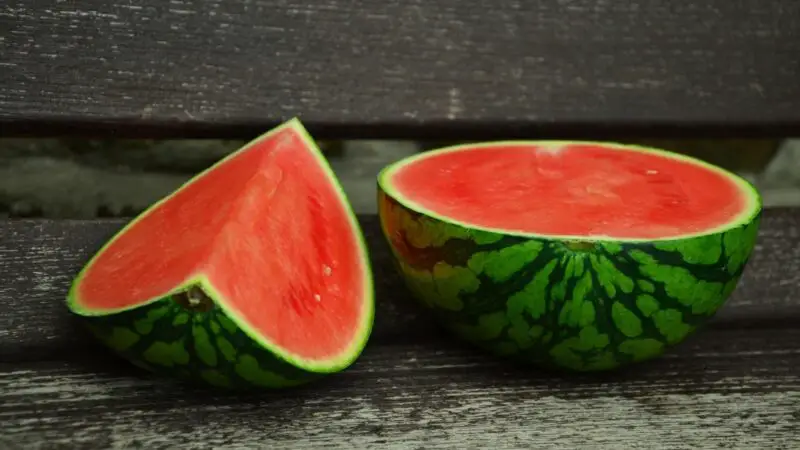
The most common way of serving watermelons is to freeze them and then place them in a container for the chickens to eat. You can even serve the fruit directly.
Combining watermelons with other fruits and vegetables to make a salad is another great way for chickens to enjoy watermelons. You can also try making watermelon soup with mint added to cool them down on hot days.
Can Chickens Eat Unripe Watermelons?
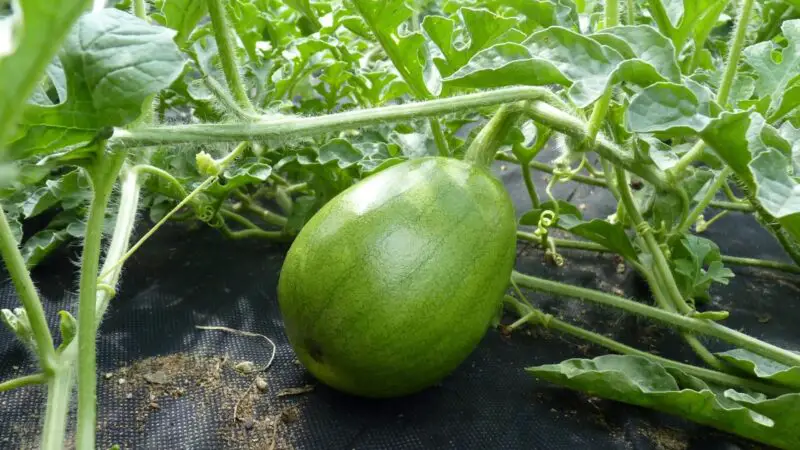
Chickens can eat unripe watermelon. But if you want your chickens to consume the most amount of nutrients, serve them when they’re at peak ripeness.
For example, ripe watermelons have large amounts of lycopene. It’s a nutrient that gives the red color of the watermelon’s flesh and is considered an effective antioxidant and helps repair damaged cells.
Watermelons have 40% more lycopene than raw tomatoes, which are as red as can be. As such, unripe watermelons will have lesser amounts of lycopene.
Can Chickens Eat Rotten Watermelon?
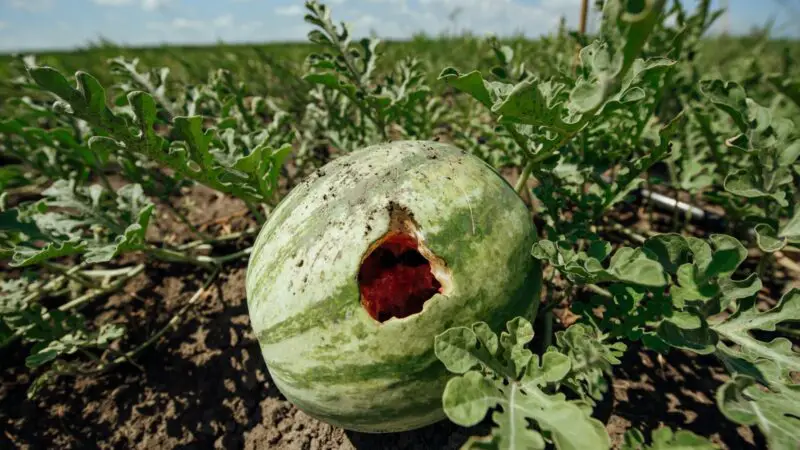
Chickens cannot eat rotten watermelon. Rotten watermelons have mycotoxins which, when ingested in critical amounts, can cause illnesses in chickens affecting the liver, kidney, reproductive tract, and more.
Be responsible for chicken owners by feeding your chickens with ripe watermelons. Always watch out for molds or fungi growing and immediately discard the entire watermelon fruit if there are.
Can Baby Chicks Eat Watermelon?
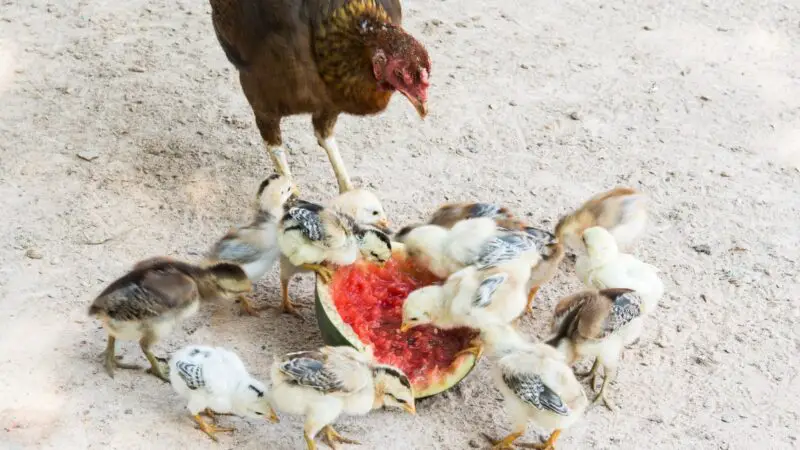
Baby chicks can eat watermelon. The watermelon’s health benefits will ensure their proper growth. However, they shouldn’t be fed with watermelon seeds and skin.
Caution should also be properly exhibited when feeding them with the leaves and stalk. For the safest results, feed them only the actual flesh of the watermelon.
Related: 8 Baby Chick Treats | Safe and Nutritious
Frequently Asked Questions
What Fruit Is Bad for Chickens?
Avocados are bad especially for caged birds like chickens. They contain a toxin called persin that causes myocardial necrosis or simply a heart attack when ingested. Persin is highly concentrated in the leaves of the avocado.
Apples are also bad for chickens. The seeds contain cyanide in them, which can be poisonous. The bark, seeds, leaves, and stem contain 7 different types of alkaloids, which are dangerous if ingested in large amounts.
Other harmful fruits include dried beans, eggplant, and tomatoes.
What Food Kills Chickens?
Chocolates can cause irregular heart beats and heart attacks that will eventually lead to death within 24 hours if not immediately treated by medical professionals.
Rotten food, in general, can be deadly to chickens. Not only does it attract insects, but they also facilitate the growth of Clostridium botulinum, a type of bacteria known for its neurotoxicity, which causes botulism in chickens and imminent death.
Soybeans and peanuts are particularly deadly for chicks and smaller chickens because of the presence of trypsin inhibitors which will adversely affect digestion and growth.
Is Bread Good for Chickens?
Bread is good for chickens. It contains a fair enough amount of cysteine, methionine, vitamin B1, and magnesium, which are all helpful and healthy micronutrients for chickens.
Do Chickens Eat Carrots?
Chickens eat carrots. It has excellent nutritional benefits and is generally safe for chickens to consume. In fact, a study claims that adding carrots as supplements in chicken feed can boost the bird’s welfare.
It has vitamins A, B6, and K1, which can aid in vision repair, digestion, and improve bone health, respectively. Carrots are also rich in glutathione (antioxidant for livers) and potassium.
They are usually served raw to chickens to preserve most of their nutrients. Once carrots are cooked, it loses some of their benefits.
Do Chickens Eat Popcorn?
Chickens eat popcorn. It is a good source of fiber and is already healthy, even without toppings such as butter or salt.
It also contains polyphenols which are important in chickens’ digestion, nutrient absorption, productivity, and ultimately help them in their growth. Polyphenols also have antioxidizing effects and can activate metabolites.
Is Corn Bad for Chickens?
Corn is not bad for chickens. This is because it contains fiber and polyphenols that are quite beneficial for chickens. Thus, it is safe for them to consume corn.
Summary
Watermelons are healthy for chickens due to the presence of micronutrients that help regulate and aid in chickens’ metabolic and immune system functions. They also quite enjoy it, especially when the weather is hot and the watermelons are served cold.
All parts of the watermelon are edible, but it is not recommended for chicks and smaller chickens to eat the seeds and skin to avoid any problems.
List of Sources
“Dog Days” of Summer Affecting Chickens
Water Management Key to Helping Chickens Beat the Heat
Evaluation of Watermelon Seed Meal as a Feed for Poultry
Food Safety in Thailand 1: It Is Safe to Eat Watermelon and Durian in Thailand
